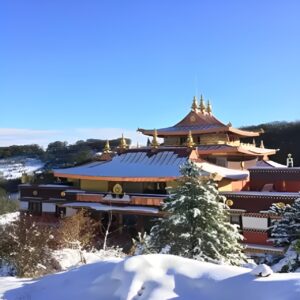 Guest speaker Jakob Leschly explores the Bardo of Meditation
Guest speaker Jakob Leschly explores the Bardo of Meditation
“If you even for a split moment don’t go to the past, don’t go to the future and just be aware, that moment is this exceptional, incredible world (of samadhi). This world is uncontaminated by references. What an amazing world!”
Dzongsar Khyentse Rinpoche – Bardo teachings 2022
LINK TO RECORDING
…………………………………………………………………………………………………………………………………………………………………………………………..
Sunday 13 August, 2023
 Guest speaker Chagdud Khadro explores the Bardo of Dying
Guest speaker Chagdud Khadro explores the Bardo of Dying
“In the Bardo of dying, the mind experiences various visions and manifestations.
Remain calm and undisturbed, recognise them as the play of your own mind.
Rest in the nature of mind and attain liberation.”
Chogyam Trungpa Rinpoche
LINK TO RECORDING
……………………………………………………………………………………………….
Sunday 24 September, 2023
 Guest speaker Do Tulku as he explores the Bardo of Dharmata
Guest speaker Do Tulku as he explores the Bardo of Dharmata
“The Bardo of Dharmata is the time for mastering the crucial point: to be unafraid and instead recognise the nature of mind, which is manifest as self-radiance of knowing. This radiance has three forms – sounds, colours and lights. As they manifest don’t be afraid of these peaceful and wrathful displays, they are your own display. For most people such a groundless, centreless and boundless display is unfamiliar and therefore very scary; there are no handles on anything, nothing to relate to as being here or there. Recognise that it is just the play of dharmata, and don’t give in to fear, dread or panic.”
– Erik Pema Kunsang
LINK TO RECORDING
……………………………………………………………………………………………….
 Sunday 10 December, 2023
Sunday 10 December, 2023
“After body and mind have separated, the sounds, colours and lights and so forth of the luminosity of dharmata disappear, due to their nature not having been recognised. The period from the arising of the confused tendencies up until one enters the womb of the next life is called the karmic bardo of becoming.”
– Tsele Natsok Rangdrol “The Mirror of Mindfulness”
Link to recording posted soon
……………………………………………………………………………………………….
 Sunday 14 January, 2024
Sunday 14 January, 2024
For centuries, meditators have been using songs to remind themselves of very important key points. This song is about life and death. It’s especially about how to use every situation and every experience to improve and liberate our minds: your normal everyday life, dream and deep sleep, the states of mind during meditation, the process of consciousness separating from the body, being face to face with unstructured reality as completely naked consciousness, and finally the process of seeking and choosing the best place of reincarnation, reconnecting with a body for rebirth. The seven verses deal with situations that we meet as human beings. This is true whether we are spiritual, religious, atheists or freethinkers. – Erik Pema Kunsang
.
Erik Pema Kunsang, the renowned translator and dharma teacher, has been awarded the
Khyentse Foundation Fellowship—the highest honor that the foundation grants an individual. A prolific translator, Erik has put together numerous dharma books. Notable examples include The Light of Wisdom, volumes 1 to 5, by Padmasambhava and Jamgön Kongtrül;
Blazing Splendor: The Memoirs of Tulku Urgyen Rinpoche; and
Mirror of Mindfulness, a commentary on the bardo states by Tsele Natsok Rangdröl. We are grateful for his invaluable translation of these precious dharma texts and for his other contributions to the field, such as his editorial work for
84000 and lately, mentoring the translators for
Khyentse Vision Project. The foundation is overjoyed to nominate Erik as the 2022 Khyentse Fellow.
When we asked Rinpoche to say something about the Erik he knows, he responded with a touching reply:
“From the time I was a teenager trying to learn Danish from him, I have known this man and occasionally even observed him. In all that time, I have noticed that he was not going astray. He went from one great master to another, each one of whom was the Buddha in person. During all this time, this man has not wasted his time but instead gained profound Buddhist knowledge and subsequently became a great translator. But all that does not really move me. What moves me most is that, in my humble opinion, he has become a genuine dharma practitioner. And that is very rare today, even among Tibetans. I don’t say this lightly and had to think really hard before saying it. So, coming from someone like me with a mountainlike ego and pride, I hope people will take a bit seriously my deep appreciation for Erik Pema Kunsang.” — Dzongsar Khyentse Rinpoche, May 2022, Bir, India
The above text and photo was included in the KF News August 2022
………………………………………………………………………………
 Please donate to support SI Australia, so we are able to continue to offer this and other teachings. Siddhartha’s Intent Australia is a not-for-profit organisation entirely run by volunteers. Your donation will directly help with the costs of providing our program.
Please donate to support SI Australia, so we are able to continue to offer this and other teachings. Siddhartha’s Intent Australia is a not-for-profit organisation entirely run by volunteers. Your donation will directly help with the costs of providing our program.




 Guest speaker
Guest speaker  Guest speaker
Guest speaker  Guest speaker
Guest speaker  Guest speaker
Guest speaker  Sunday 10 December, 2023
Sunday 10 December, 2023 Sunday 14 January, 2024
Sunday 14 January, 2024 




